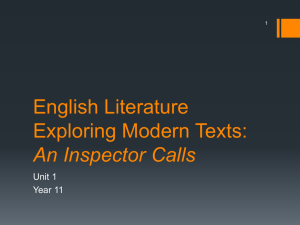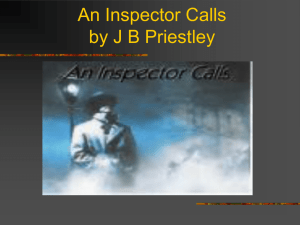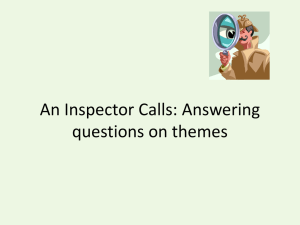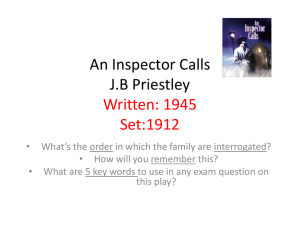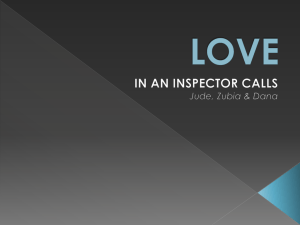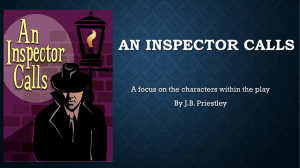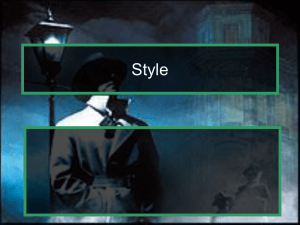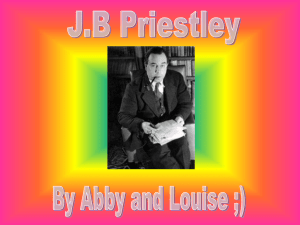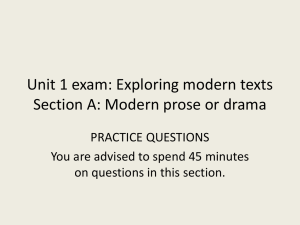L19 Exam questions
advertisement
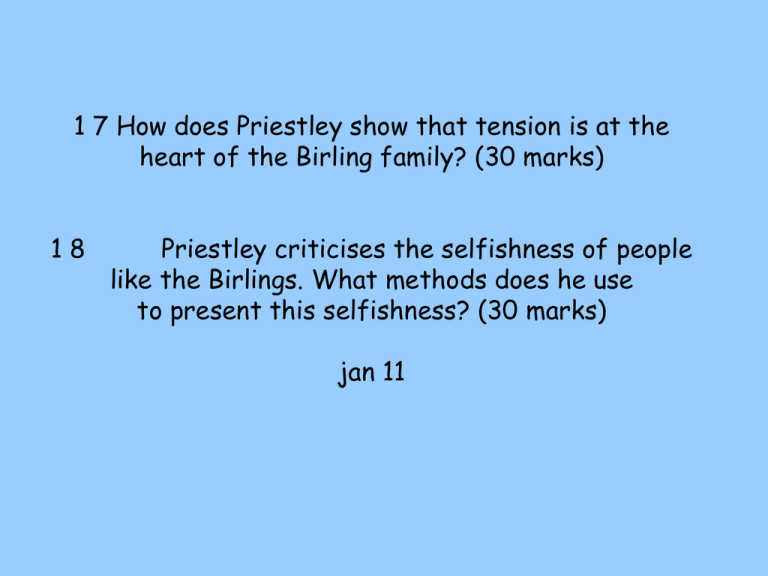
1 7 How does Priestley show that tension is at the heart of the Birling family? (30 marks) 18 Priestley criticises the selfishness of people like the Birlings. What methods does he use to present this selfishness? (30 marks) jan 11 GCSE English Literature Unit 1 Modern Texts An Inspector Calls by J B Priestley This is an exam text; you will have a choice of two questions on Section A; worth 30 marks; 20% of your final grade. YOU WILL ONLY HAVE 45 MINS It would be advisable if you bought your own copy of the play so that you can write notes in your book. Assessment Objectives AO 1 Respond to texts critically and 10% imaginatively; select and evaluate relevant textual detail to illustrate and support interpretations AO 2 10% Explain how language, structure and form contribute to writers’ presentation of characters, ideas, themes and settings Priestley criticises the selfishness of people like the Birlings. What methods does he use to present this selfishness? (30 marks) UNDERLINE KEY WORDS BRAINSTORM YOUR IDEAS AO1 Respond to texts critically and imaginatively; select and evaluate relevant textual detail to illustrate and support interpretations In what way were these characters selfish? Mr Birling Mrs Birling Sheila Selfishness Gerald Eric AO2 Explain how language, structure and form contribute to writers’ presentation of characters, ideas, themes and settings What techniques did Priestley use? Mr Birling Mrs Birling Sheila Selfishness Gerald •Dramatic irony •Satires their behaviour •Highlights their faults through Inspector Eric An Inspector Calls has been called ‘a play of contrasts’. Write about how Priestley presents some of the contrasts. (30 marks) An Inspector Calls has been called ‘a play of contrasts’. Write about how Priestley presents some of the contrasts. (30 marks) An Inspector Calls has been called ‘a play of contrasts’. Write about how Priestley presents some of the contrasts. (30 marks) TIMED EXAM PRACTICE – 45 mins ‘Inspector Goole merely functions as a mouthpiece for Priestley’s ideas.’ What do you think is the inspector’s function in the play and how does Priestley present him? (30 marks) UNDERLINE KEY WORDS - PLAN YOUR IDEAs TIMED EXAM PRACTICE – 45 mins Write about the differences between Arthur Birling and Eric Birling in the play An Inspector Calls. You should write about: what Arthur and Eric Birling are like their different attitudes the methods Priestley uses to present Arthur and Eric Birling. (30 marks) 1 7 How does Priestley show that tension is at the heart of the Birling family? (30 marks) 18 Priestley criticises the selfishness of people like the Birlings. What methods does he use to present this selfishness? (30 marks) jan 11 8 Priestley criticises the selfishness of people like the Birlings. What methods does he use to present this selfishness? (30 marks) • AO1 the lack of understanding between the generations – Mr Birling does not understand his children sibling squabbles lack of compassion and differing views/beliefs brought out by the Inspector the characters are outspoken and do not consider each other the impact of the Inspector takes the shroud off the niceties within the family • AO2 the play form allows tension to be created through the staging and scene directions – the use of subdued lighting at the beginning to create a relaxed atmosphere could in fact be shrouding the true feelings at the table especially as the language hints at tension the use of cliff hangers especially used to show Sheila and Gerald‟s relationship and problems (it will be assumed by students that as they are engaged he is considered part of the family) the dialogue between the characters is a clear indication of tension, e.g. Birling and Eric. the children still being treated as „little children‟, seen through the language • AO1 the lack of understanding from Birling of the working class Sheila having no regard for other people as seen in the incident at Milwards Eric stealing money to „sort out his problem‟ Sybil – having a position in society and not using it correctly social satire of the wealthy class and their lack of appreciation for others • AO2 dramatic irony – to humiliate those similar to Birling – shows their self-obsession and that their assuredness is misplaced the fact the play is set in 1912 and written in 1945/6 – satirises his society and those in it like Birling who have not learnt from past mistakes creating a chain of events to show that one action can have many consequences through the dialogue of the characters – Priestley is able to highlight their faults through the Inspector‟s tone and style of questioning – mouthpiece for Priestley Jun 11 • An Inspector Calls has been called ‘a play of contrasts’. • Write about how Priestley presents some of the contrasts in the play. (30 marks) • OR • Question 18 • 1 8 How does Priestley present the change in Sheila during the course of the play • An Inspector Calls? How do you think this change reflects some of Priestley’s ideas? • (30 marks) • Answers might deal with some of the following aspects of the play: • AO1 contrast between Sheila and Eva/Daisy e.g. privileged/unprivileged, rich/poor contrast between attitudes of youth and age e.g. self-satisfaction of the Birlings, openness to change of the younger generation contrast between the Inspector and the family e.g. the Inspector‟s feelings of responsibility and the absence of these feelings in the Birlings contrast between the Inspector‟s self-assurance and the disappearance of the selfassurance of the others during the course of the play. • AO2 cheerful mood of the play at the beginning, which then gets darker as the play progresses stage directions/lighting contrast in language used by Inspector and Birling in their speeches use of irony to show and emphasise contrast-impossibility of war and the impossibility that the Titanic could sink stage directions for characters‟ dialogue from „smiling‟, „gaily‟ etc to „hysterically‟, „hesitantly‟. • AO1 Sheila is more open to change than the other characters, especially the older generation; she begins to realise the difference between right and wrong; she becomes more independent as the play progresses she is very different at the end of the play to the beginning; from a girl pleased with life, self-centred and attractive she develops a conscience and feels regret over her dealings with Eva she learns from experience and is honest about her behaviour realises that honesty and truth are important ideas she reflects of Priestley e.g. responsibility • AO2 stage directions at the beginning; „very pleased with life and rather excited‟ Sheila‟s use of language – seen by her move from dependence on parents and her future husband to more independence. Her more passionate use of language, her use of sarcasm (“So nothing‟s happened, so there‟s nothing to be sorry for, nothing to learn.”) dramatic language “We killed her” stage directions– she „shivers‟, „tensely‟ (showing her fear) actions – hands back the engagement ring, shows her independence by saying to her father “I‟m not a child”. Shows she becomes a bit like the inspector – asking questions, contradicting her mother. Jan 12 • Question 17 • 1 7 Arthur Birling says, ‘If we were all responsible for everything that happened to everybody • we’d had anything to do with, it would be very awkward, wouldn’t it?’ • How does Priestley present ideas about responsibility in An Inspector Calls? (30 marks) • OR • Question 18 • 1 8 How do you respond to Gerald in An Inspector Calls? How does Priestley make you • respond as you do by the ways he writes? • (30 marks) • AO1 May refer to Birling’s quote and thus his attitude to responsibility – and other characters’ attitudes to responsibility and how they are different The Inspector’s attitude to responsibility – ‘each of you helped to kill her’ – and his final speech to a wider audience – ‘millions and millions of Eva Smiths...’ Socialist views about responsibility – collective responsibility – everyone in society linked Ideas about the play as a warning about how we should be responsible for our actions • AO2 The words ‘responsible’ and ‘responsibility’ are used by most characters in the play – comment on some examples ‘fire and blood and anguish’ – significance of the choice of these words The use of stage directions to reveal the characters’ reactions to what the Inspector has to say about how they treated Eva Smith How Priestley creates a sense of self-satisfied smugness about the Birling family, where and how they live – thus little sense of their need to move outside the family and think of others [except Sheila / Eric] • AO1 Aristocrat – ideas about class system – essentially engaged to someone ‘beneath’ him Not as willing as Sheila to admit his guilt – at first pretends he never knew Daisy Renton – link with Mr Birling? Seems to have some genuine feelings for Daisy Renton In Act 3, Gerald tries to come up with as much evidence as possible to prove the Inspector is a fake – wants to protect himself rather than change himself Which generation does he ‘fit’ most readily with? • AO2 Regular references to Gerald’s ‘disappearance’ the previous summer makes the audience wonder about him References to any stage directions which reveal Gerald’s attitudes / feelings How Priestley creates a sense of self-satisfaction in Gerald when he thinks ‘Everything’s all right now’ Presentation as an ‘easy, well-bred young man-about town’
